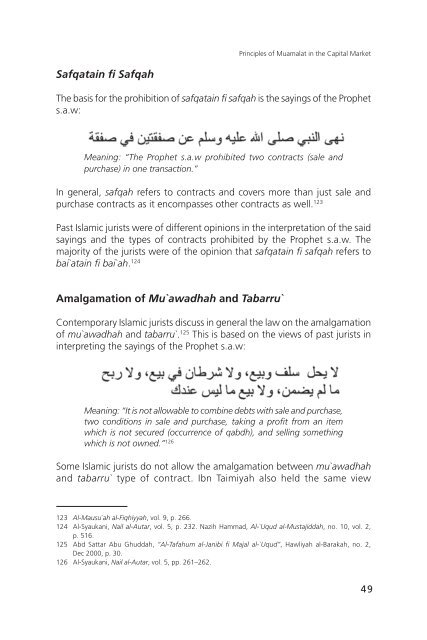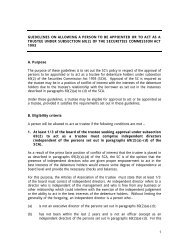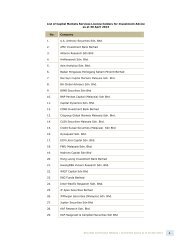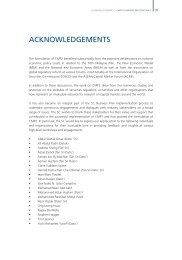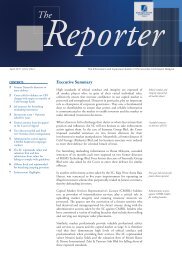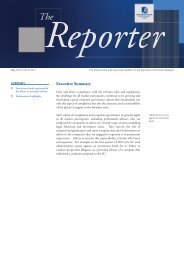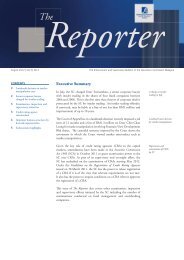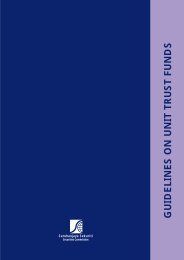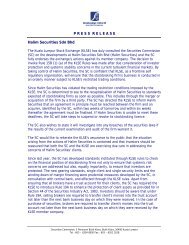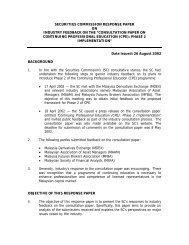Resolutions of the Securities Commission Shariah Advisory Council
Resolutions of the Securities Commission Shariah Advisory Council
Resolutions of the Securities Commission Shariah Advisory Council
Create successful ePaper yourself
Turn your PDF publications into a flip-book with our unique Google optimized e-Paper software.
Safqatain fi Safqah<br />
Principles <strong>of</strong> Muamalat in <strong>the</strong> Capital Market<br />
The basis for <strong>the</strong> prohibition <strong>of</strong> safqatain fi safqah is <strong>the</strong> sayings <strong>of</strong> <strong>the</strong> Prophet<br />
s.a.w:<br />
Meaning: “The Prophet s.a.w prohibited two contracts (sale and<br />
purchase) in one transaction.”<br />
In general, safqah refers to contracts and covers more than just sale and<br />
purchase contracts as it encompasses o<strong>the</strong>r contracts as well. 123<br />
Past Islamic jurists were <strong>of</strong> different opinions in <strong>the</strong> interpretation <strong>of</strong> <strong>the</strong> said<br />
sayings and <strong>the</strong> types <strong>of</strong> contracts prohibited by <strong>the</strong> Prophet s.a.w. The<br />
majority <strong>of</strong> <strong>the</strong> jurists were <strong>of</strong> <strong>the</strong> opinion that safqatain fi safqah refers to<br />
bai`atain fi bai`ah. 124<br />
Amalgamation <strong>of</strong> Mu`awadhah and Tabarru`<br />
Contemporary Islamic jurists discuss in general <strong>the</strong> law on <strong>the</strong> amalgamation<br />
<strong>of</strong> mu`awadhah and tabarru`. 125 This is based on <strong>the</strong> views <strong>of</strong> past jurists in<br />
interpreting <strong>the</strong> sayings <strong>of</strong> <strong>the</strong> Prophet s.a.w:<br />
Meaning: “It is not allowable to combine debts with sale and purchase,<br />
two conditions in sale and purchase, taking a pr<strong>of</strong>it from an item<br />
which is not secured (occurrence <strong>of</strong> qabdh), and selling something<br />
which is not owned.” 126<br />
Some Islamic jurists do not allow <strong>the</strong> amalgamation between mu`awadhah<br />
and tabarru` type <strong>of</strong> contract. Ibn Taimiyah also held <strong>the</strong> same view<br />
123 Al-Mausu`ah al-Fiqhiyyah, vol. 9, p. 266.<br />
124 Al-Syaukani, Nail al-Autar, vol. 5, p. 232. Nazih Hammad, Al-`Uqud al-Mustajiddah, no. 10, vol. 2,<br />
p. 516.<br />
125 Abd Sattar Abu Ghuddah, “Al-Tafahum al-Janibi fi Majal al-`Uqud”, Hawliyah al-Barakah, no. 2,<br />
Dec 2000, p. 30.<br />
126 Al-Syaukani, Nail al-Autar, vol. 5, pp. 261–262.<br />
49


